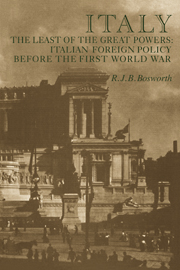Book contents
- Frontmatter
- Contents
- Dedication
- Preface
- List of maps
- 1 Society and politics in Liberal Italy
- 2 New political pressure groups and foreign policy
- 3 The making of a Foreign Minister: Antonino Di San Giuliano
- 4 The Consulta: the bureaucrats of foreign policy
- 5 How Italy went to Libya
- 6 How Italy stayed in Libya
- 7 The politics of alliance: Italy in the Triple Alliance, 1912–1914
- 8 The politics of friendship: Italy, the Triple Entente, and the search for a new Mediterranean agreement, 1911–1914
- 9 ‘Un cliente maleducato’: Italy in the Dodecanese and Ethiopia, 1912–1914
- 10 Preparing to digest some spoils: Italian policy towards Turkey, 1912–1914
- 11 San Giuliano's epilogue. The realities of European war 28 June to 16 October 1914
- Conclusion
- Appendix I The Ten Commandments for Italians abroad
- Appendix II Pro-memoria on our politico-military situation, by A. Pollio
- Appendix III San Giuliano's poem about his funeral ceremony
- Abbreviations used in the notes and bibliography
- Select bibliography
- Notes
- Index
10 - Preparing to digest some spoils: Italian policy towards Turkey, 1912–1914
Published online by Cambridge University Press: 16 November 2009
- Frontmatter
- Contents
- Dedication
- Preface
- List of maps
- 1 Society and politics in Liberal Italy
- 2 New political pressure groups and foreign policy
- 3 The making of a Foreign Minister: Antonino Di San Giuliano
- 4 The Consulta: the bureaucrats of foreign policy
- 5 How Italy went to Libya
- 6 How Italy stayed in Libya
- 7 The politics of alliance: Italy in the Triple Alliance, 1912–1914
- 8 The politics of friendship: Italy, the Triple Entente, and the search for a new Mediterranean agreement, 1911–1914
- 9 ‘Un cliente maleducato’: Italy in the Dodecanese and Ethiopia, 1912–1914
- 10 Preparing to digest some spoils: Italian policy towards Turkey, 1912–1914
- 11 San Giuliano's epilogue. The realities of European war 28 June to 16 October 1914
- Conclusion
- Appendix I The Ten Commandments for Italians abroad
- Appendix II Pro-memoria on our politico-military situation, by A. Pollio
- Appendix III San Giuliano's poem about his funeral ceremony
- Abbreviations used in the notes and bibliography
- Select bibliography
- Notes
- Index
Summary
In June 1905, during his maiden speech to the Senate, San Giuliano had noted Italy's need to have a ‘world policy’ which, with his usual philosophic wisdom, he argued would allow her to join ‘the always more intense and grandiose struggle’ of the nations which was occurring in the areas of trade and of politics. Although the phrase is indicative of the extraordinary extent of Italian ambition, a ‘world policy’ is a little difficult to find in the practice of Italian diplomacy.
In the Far East, Italy limped behind the Greater Powers, her hopes but also her weakness being displayed in her particularly inglorious record during the Boxer rebellion. Then, in the race to the Forbidden City, Italian troops, humiliatingly if appropriately, beat only the Austrians. By 1914, 2.4% of Italian trade was directed to the Far East, 274 Italian citizens lived in China, and 22 Italian firms were in operation there. Italy continued to assert her Great Power role in the area, San Giuliano boasting in June 1914 that Italian success in Tien-tsin had been unexpectedly great, but fiasco was never far away. Even in commerce, Italy's balances of trade were consistently unfavourable. The only real example of successful ‘Italian imperialism’ in the Pacific and Indian oceans remained the work which Roman Catholic missionaries had continued over the centuries. There was some Italian interest in the empty lands of Australasia, either as a possible venue for, or model of, colonisation, but only a few thousand Italians had emigrated to Australia before 1914. Italy had its usual negative balance of trade with Australia.
- Type
- Chapter
- Information
- Italy the Least of the Great PowersItalian Foreign Policy Before the First World War, pp. 337 - 376Publisher: Cambridge University PressPrint publication year: 1979

